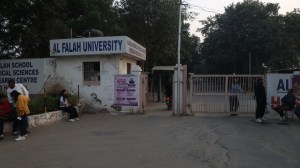End Game
Five or six days after US troops seized this city in April, Saddam and his sons, Uday and Qusay, gathered secretly with a handful of aides a...

Five or six days after US troops seized this city in April, Saddam and his sons, Uday and Qusay, gathered secretly with a handful of aides at a house in Adhamiya. The men were shocked at their defeat. They had not planned for any kind of guerrilla resistance to what they now saw would be a US military occupation.
The meeting to plan a guerrilla war was restricted to a handful of Saddam8217;s loyalists 8216;8216;so that no one would know the details of the resistance,8217;8217; said one of Uday8217;s bodyguards on Thursday.
The bodyguard agreed to an interview after Tuesday8217;s death of his former boss, but insisted that he be identified as Abu Tiba, a nom de guerre. Abu Tiba, whose father had served as a bodyguard to Saddam, worked for Uday since 1997.
Giving undisclosed details of how Iraq8217;s ruling family grappled with the shock of falling from power, he said: Saddam8217;s astonishment was obvious on Friday, April 11, 48 hours after US troops toppled the government and his most prominent statue in Baghdad.
Saddam and his sons attended the Friday prayers at the Abu Haditha mosque in Adhamiya. When the prayers were over, an old woman walked up to Saddam and demanded: 8216;8216;What have you done to us?8217;8217;
Saddam smacked his forehead with his open palm and pleaded for understanding. 8216;8216;What could I do?8217;8217; he asked. 8216;8216;I trusted my commanders8230;. They have broken the oath they took upon themselves to protect Iraq. We hope we will be back in power and everything will be fixed.8221;
Abu Tiba provided details about the movements of Saddam and his sons during the war and post war. The US missile attack on March 20 missed badly. One on April 7 came close to killing Saddam and his sons in Mansour, missing them by 10 minutes.
Video on Iraqi state television of Saddam and his sons during the war, including a startling April 4 broadcast of Saddam greeting the public on the streets of Adhamiya, was genuine.
Describing his boss, Abu Tiba said, Uday was confident when the war started but increasingly distraught as things went badly for the regime. 8216;8216;Sometimes he was tense, especially when his palaces were hit in the war,8217;8217; he said. When the war started, Uday, usually a drunken playboy, concentrated all his energies during the war to directing the fedayeen, earning the kind of respect from his father that he had not enjoyed for years.
On April 9, Uday watched the television coverage of US troops pulling down one of Saddam8217;s statues. 8216;8216;After he saw the fall of the statue on TV, he was so tense,8217;8217; Abu Tiba said. 8216;8216;His nature changed. It became very hard to talk to him8230;. He used to get angry at us, shouting endlessly.8217;8217;
Fuming over the loss of Baghdad, Saddam accused his commanders of betrayal, Abu Tiba said. Still the family did not flee. 8216;8216;They could have left Baghdad any time, but their main goal became how to organise the resistance,8217;8217; Abu Tiba said. After five or six days, they held their closed-door meeting in Adhamiya. Soon after, Uday spoke to Abu Tiba and said: 8216;8216;We8217;ll send for you when we need you.8217;8217; Uday gave him 1,000 as a gift.
Abu Tiba never got the call. 8216;8216;Before the fall of Baghdad I wanted to stop working for Uday,8217;8217; he said, not explaining why, 8216;8216;but finding US troops in Iraq, I wish I had stayed to fight, to be a martyr for my country.8217;8217;
The deaths of his sons will be hitting Saddam hard, said Tiba8217;s father, Abu Jassim, 49. 8216;8216;If he had a weapon that would do it, he would destroy all of Iraq for his sons,8217;8217; Abu Jassim said. 8216;8216;He will be more determined to avenge them now.8217;8217; But with his sons gone and so many of his top aides in custody, who will protect Saddam now, the two men were asked. Abu Tiba pointed upward. 8216;8216;God,8217;8217; he said. LAT-WP
- 01
- 02
- 03
- 04
- 05






























